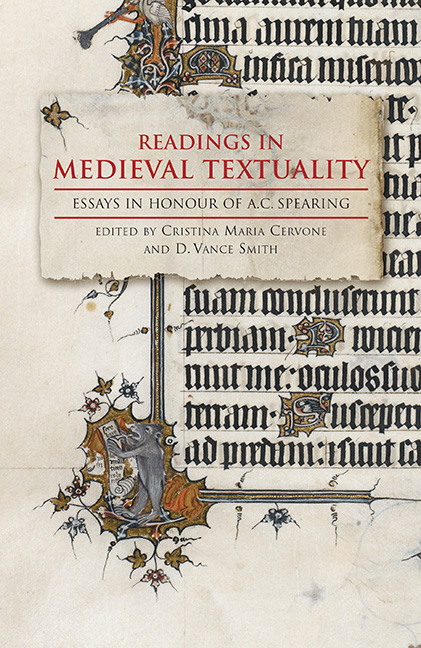Book contents
- Frontmatter
- Contents
- List of Illustrations
- List of Contributors
- A. C. Spearing's Work and Influence
- Bibliography of A. C. Spearing's Works
- I Reading Experience and Experientiality
- II Revisions and Re-visioning of Alliterative Poetry
- 4 Fayre Formez: Vernacular Scriptural Paraphrase and Lay Reading in Cleanness
- 5 Langland's Last Words
- III Subjectivity and the Self
- IV Reading for Form
- V Epilogue
- Works Cited
- Index
- Tabula Gratulatoria
4 - Fayre Formez: Vernacular Scriptural Paraphrase and Lay Reading in Cleanness
from II - Revisions and Re-visioning of Alliterative Poetry
Published online by Cambridge University Press: 25 October 2017
- Frontmatter
- Contents
- List of Illustrations
- List of Contributors
- A. C. Spearing's Work and Influence
- Bibliography of A. C. Spearing's Works
- I Reading Experience and Experientiality
- II Revisions and Re-visioning of Alliterative Poetry
- 4 Fayre Formez: Vernacular Scriptural Paraphrase and Lay Reading in Cleanness
- 5 Langland's Last Words
- III Subjectivity and the Self
- IV Reading for Form
- V Epilogue
- Works Cited
- Index
- Tabula Gratulatoria
Summary
Ever since Criticism and Medieval Poetry first appeared in 1964, Tony Spearing has been a chief advocate and practitioner of the close reading of Middle English verse. It might be equally appropriate to call him one of the best close re-readers of that poetry, because of his ongoing commitment to finding new ways to illuminate and appreciate old texts. Nowhere has his flexible critical intelligence been more evident than in his criticism on the four anonymous poems uniquely found in Cotton Nero A.x. Even before he published The Gawain-Poet: A Critical Study in 1970, he already had work in print on Patience, Pearl, and Sir Gawain and the Green Knight, and he has since returned to each poem at least once, at times providing striking revisions of his earlier work.
This essay celebrates Spearing's contribution to medieval studies by focusing on reading – in this case, the place of lay reading – in the second poem in the manuscript, Cleanness, also known as Purity. Sometimes called a homily in verse, Cleanness is dominated by three Old Testament narratives that the poet uses to elucidate both clannesse and its opposite, fyl.e. The prominence of Latin–English scriptural paraphrase in the work has led Nicholas Watson to identify Cleanness as an example of vernacular theology, and he has argued that the poem and its companions
represent a sustained attempt to translate an ancient tradition of thought concerning the centrality of purity in the Christian life – a tradition going back at least to the virginity literature of the fourth and early fifth centuries – from its old context in monastic and anchorite writing to address the needs and aspirations of a lay elite.
My aim here is to shift the discussion from the content of vernacular theology in Cleanness to what the poet's choice and handling of scriptural texts may signal about his attitudes towards the audience for vernacular scriptural paraphrase. The question of how to make materials traditionally found in Latin accessible to the non-specialist audience assumed for vernacular writing was a persistent and increasingly vexed issue in later medieval England. As I suggest below, these concerns surface explicitly in the prologues to a number of vernacular religious texts, and such prologues can be seen as an ongoing attempt, in a culture that habitually associated literacy with Latinity, to define what it might mean to be a vernacular reader.
- Type
- Chapter
- Information
- Readings in Medieval TextualityEssays in Honour of A.C. Spearing, pp. 47 - 64Publisher: Boydell & BrewerPrint publication year: 2016



